牛津英语上海版六年级下册6B Module 1 Unit 4 Staying healthy 4课时教案附反思
Unit4单元知识结构图牛津上海版六年级英语下册
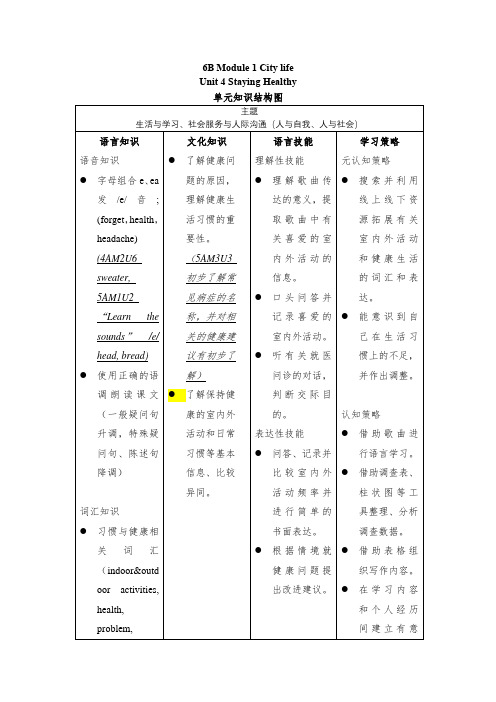
6B Module 1 City life Unit 4 Staying Healthy 单元知识结构图
本单元中,学生将围绕运动与健康这一主题,在阅读与听写活动中获取
室内外活动、健康问题和日常习惯等信息;了解就医问诊的方法,分析可能导致健康,做出改变,提升健康生活意识。
在歌曲学唱中,了解常见室内外活动,认识劳逸结合的健康生活方式;在谈论最喜爱的室内外活动中理解个人喜好的差异,了解调查图表的特点与作用;在Joe和kitty与医生进行有关健康问题的对话中,了解常见健康问题、成因及改善建议;在写作活动中,通过记录日常活动习惯,了解习惯与健康的关联,提升健康意识。
牛津英语上海版六年级下册6B Module 1 Unit 4 Staying healthy 4课时教案附反思
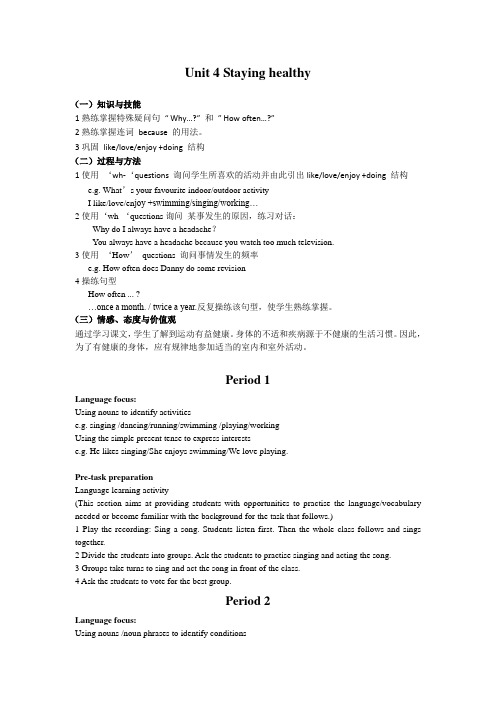
Unit 4 Staying healthy(一)知识与技能1熟练掌握特殊疑问句“ Why…?” 和” How often…?”2熟练掌握连词because 的用法。
3巩固like/love/enjoy +doing 结构(二)过程与方法1使用‘wh-‘questions 询问学生所喜欢的活动并由此引出like/love/enjoy +doing 结构e.g. What’s your favourite indoor/outdoor activityI like/love/en joy +swimming/singing/working…2使用‘wh-‘questions询问某事发生的原因,练习对话:Why do I always have a headache?You always have a headache because you watch too much television.3使用‘How’questions 询问事情发生的频率e.g. How often does Danny do some revision4操练句型How often ... ?…once a month. / twice a year.反复操练该句型,使学生熟练掌握。
(三)情感、态度与价值观通过学习课文,学生了解到运动有益健康。
身体的不适和疾病源于不健康的生活习惯。
因此,为了有健康的身体,应有规律地参加适当的室内和室外活动。
Period 1Language focus:Using nouns to identify activitiese.g. singing /dancing/running/swimming /playing/workingUsing the simple present tense to express interestse.g. He likes singing/She enjoys swimming/We love playing.Pre-task preparationLanguage learning activity(This section aims at providing students with opportunities to practise the language/vocabulary needed or become familiar with the background for the task that follows.)1 Play the recording: Sing a song. Students listen first. Then the whole class follows and sings together.2 Divide the students into groups. Ask the students to practise singing and acting the song.3 Groups take turns to sing and act the song in front of the class.4 Ask the students to vote for the best group.Period 2Language focus:Using nouns /noun phrases to identify conditionse.g. a headache/a stomach-ache/toothache/a cold/a fever/a sore throatAsking ‘wh-‘questions to find out the reasone.g. Why do I always have a headacheUsing connectives to give reasonse.g. You always have a headache because you watch too much television.Using adverbs to express degreee.g. too much/too manyPre-task preparation1 Introduce new vocabulary items: a headache, a stomach-ache, toothache, a cold, a fever, a sore throat. Encourage students to use facial expressions and body language to help convey the meanings.2 Play the recording: Look and learn and Think and say. Students listen and follow in their books.3 Play the recording again. Students listen and repeat.4 Invite students to talk about their experience of suffering from a headache, a stomach-ache, toothache, a cold, a fever or a sore throat.While-task procedure1 Students work in groups of five Distribute a copy of photocopiable page 9 to each group. Four members in the group pretend to feel unwell and one member pretends to be Doctor Chen. Ask students to follow the modeled dialogue and work together to complete the dialogue in the other pictures. Tell them to think about different reasons for not feeling well. Then students practise the dialogue in groups.2 Groups take turns to role-play the dialogue in class. Encourage students to use facial expressions and body language and be as dramatic as possible. Write all the reasons for not feeling well on the board to get students familiar with the target language. Finally, vote for the best group.3 Still in groups, ask students to draw and write down different ways for keeping themselves healthy. Collect students’work and put it on the display board.Post-task activityWorkbook page 7ConsolidationGrammar Practice Book 7A page 12Period 3Language focus:Using adjectives to describe activitiese.g. indoor activities/outdoor activitiesUsing nouns to identify activitiese.g. fishing /cycling/swimmingUsing ‘wh-‘questions to find out various kinds of specific information about a persone.g. What’s your favourite indoor/outdoor activityAsking ‘How’questions to find out quantitye.g. How many of my classmates like watching television bestUsing the simple present tense to express opinionse.g….students like …best.Pre-task preparation1 Differentiate between indoor activities and outdoor activities. Write indoor activities and outdoor activities on the board. Read them aloud. Invite the whole class to repeat the words after you. Explain briefly that indoor activities are activities carried on inside a building and outdoor activities are activities carried on outside a building.2 Invite a student to read the list of indoor and outdoor activities in Read and match aloud. Ask a few more able students to think of more indoor and outdoor activities.3 Give students some time to complete Read and match. Check answers orally.4 Students work in pairs to practise the target language in A survey .Invite some pairs of students to role-play the dialogue in class.While-task procedure1 Students work in groups. Distribute a copy of photocopiable page 10 to each group. Ask students to carry out the survey using the target language. Each group completes one survey form. Write down the other groups’findings on the survey form as well. Each group completes a simple report.2 Invite representatives from the groups to come out to the front and read their reports aloud .Collect students’work and put it on the display board.3 Make sure students know how to tead and draw bar chart .4 Students work in groups. Distribute a copy of photocopiable page 11 to each group. Ask students to carry out the survey using the target language. Each group completes one survey form. Write down the other groups’findings on the survey form as well. Each group completes a simple report and draws a bar chart.5 Invite representatives from the groups to come forward and read their reports aloud. Collect students’work and put it on the display board.ConsolidationGrammar Practice Book 7A page 13Period 4Language focus:Asking ‘How’questions to find out frequencye.g. How often does Danny do some revisionUsing the simple present tense to describe habitual actionse.g. He does some revision once a month.Using adverbs to express frequencye.g. once a month/ twice a yearPre-task preparation1 Remind students about the concept of ‘work and play’and review the song on page 14 again2 Invite a more able student to come out to the front and read Danny’s timetable. Other students keep their books closed and listen carefully3 Ask students some questions to check their understanding. Ask: How often does Danny do some revision How often does Danny watch television How often does Danny practise swimming How often does Danny help do the housework to elicit: He does some revision once a month. He watches television three times a day. He practices swimming twice a year. He never helps do the housework.4 Ask students to give their opinion about Danny’s timetable. Write the list of opinions on the board. In conclusion, students should understand that Danny’s timetable is not very good.While-task procedure1 Ask each student to think of and write a good timetable for himself/herself.3 When the students have finished, ask them to work in pairs and compare their timetables with their classmates’timetables by using the target language. One student starts the conversation by asking: How often do you…They take turns to ask and answer questions about the timetables.ConsolidationGrammar Practice Book 7A pages 14 and 16Photocopiable pages 12, 13, 14 and 15NOTES: (单元教后记)1、通过学习本单元课文,学生了解到运动有益健康。
Module1Unit4Stayinghealthy2_20120308103911531
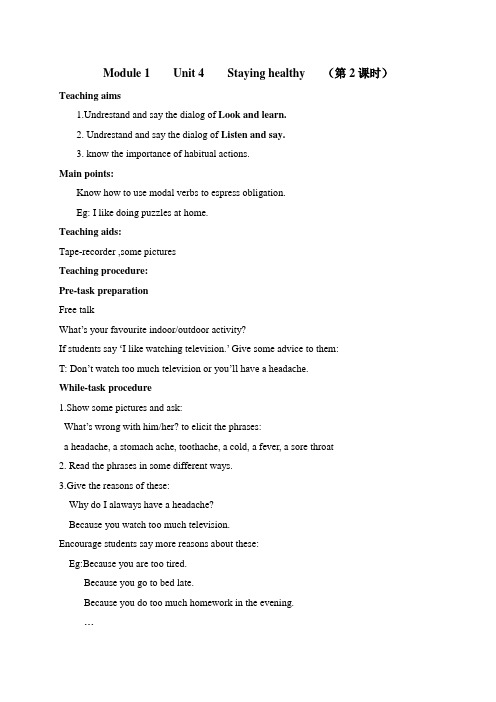
Module 1 Unit 4 Staying healthy (第2课时)Teaching aims1.Undrestand and say the dialog of Look and learn.2. Undrestand and say the dialog of Listen and say.3. know the importance of habitual actions.Main points:Know how to use modal verbs to espress obligation.Eg: I like doing puzzles at home.Teaching aids:Tape-recorder ,some picturesTeaching procedure:Pre-task preparationFree talkWhat’s your favourite indoor/outdoor activity?If students say ‘I like watching television.’ Give some advice to them:T: Don’t watch too much television or you’ll have a headache.While-task procedure1.Show some pictures and ask:What’s wrong with him/her? to elicit the phrases:a headache, a stomach ache, toothache, a cold, a fever, a sore throat2. Read the phrases in some different ways.3.Give the reasons of these:Why do I alaways have a headache?Because you watch too much television.Encourage students say more reasons about these:Eg:Because you are too tired.Because you go to bed late.Because you do too much homework in the evening.…4. Talk about these in groups, Try to say more about the reasonsS1: Why do I always have a headache/ a stomach ache/ a fever/ a cold/ toothache?S2: Because …5.Play the cassette for Listen and say. The students listen and repeat.6. Give the students time to read the dialogues silently.7. Act as the doctors and the patients, make dialogues in groups.(鼓励学生联系生活实际说出生病的原因以及防治的方法。
牛津英语上海版六年级下册知识点整理

牛津英语上海版六年级下册知识点整理Module1 City lifeUnit1 Great cities in Asian词组:the capital of... ...的首都 north-east东北 from...to...从...到...in the past在过去 the Great Wall长城 more than=over超过eat dumpling吃饺子 tall buildings高楼大厦huge department stores大型的百货商店 a lot of许多语法点:1.Beijing is north of Shanghai.北京在上海的北部。
(1)两地不相邻:A is north of B.(2)所属关系:A is in the north of B.(3)两地接壤:A is on the north of B.2.How far is it from Shanghai to Beijing?从北京到上海有多远?How far... 多远。
询问距离的远近,路程的长远。
3.How long does it take to travel from Shanghai to Beijing by train?坐火车从上海到北京要多久?(1)How long...多久。
询问时间长短。
How long…多长。
用于询物的问长度。
(2)by+交通工具,表示“乘...交通工具”,用How提问。
4.It takes about ten hours.大约需要十小时It takes (sb.) st. to do sth. 做某事需要花费多长时间。
5.They enjoy eating dumplings.他们喜欢吃饺子enjoy/like/love doing sth. 喜欢做某事6.Two and a half days=Two days and a half两天半Half an hour=one and a half hours=one/an hour and a half一个半小时Unit2 At the airport词组:plane ticket机票 silk scarf丝巾 a lot of/plenty of大量的,许多departure time出发时间 leave for出发去某地 have to不得不be going to将要 arrive at到达boarding card登机牌 name tap姓名语法点:1.Aunt Judy and Uncle Mike have lived in Los Angeles for six years.朱迪婶婶和迈克叔叔在洛杉矶已住了六年。
(完整版)上海版牛津英语六年级下册6B重点知识点复习整理(最新整理)

(完整版)上海版牛津英语六年级下册6B重点知识点复习整理(最新整理)上海版牛津英语六年级下册6B重点知识点复习整理Module 1 City LifeUnit 1 Great cities in Asia【知识点梳理】1.方位词:east / west / north / south / north-east / north-west / south-east / south-west用法:a. 两地不相邻: e.g. A is north B. (= to the south of)b. 两地接壤: e.g. A is on the north of B.c. 所属关系,A包含B, B属于A: e.g. B is in the north of A.2. by + 交通工具表示“乘……交通工具”, 用how进行提问e.g. by bus / ferry / train / ship / underground… by plane = by air, by ship = by sea3. How far…多远(询问距离的远近,路程的长短)e.g. Hoe far is it from your home to school? 从你家到学校有多远?4. How long…多长,多久(询问时间的长短,提问一段时间)e.g. How long does it take to travel from Shanghai to Beijing by train? 坐火车从上海到北京要花多长时间?5. It takes (sb.) some time to do sth. 做某事需要花费多少时间e.g. It takes me five hours to make this modal plane. 做这个模型飞机花了我5个小时。
6. like / love / enjoy doing sth. 喜欢做某事e.g. The people in Bangkok like / love / enjoy eating spicy food. 曼谷人喜欢吃辛辣食物。
牛津上海版六年级英语下册unit 4 staying healthy 优秀课件

Why do I always have a cold?
PIGGY BANK
GOLD MINE
2-2
It’s because you don’t wear enough clothes, I’m afraid.
What should I do?
12
You should wear more clothes.
3. Alan stayed at home from school because he had a cough and a ______c_o_l_d______.
4. Ben’s head hurt. He has a ____h_e_a_d__a_c_h_e___.
Listen and say
GOLD MINE
Read and write
How did these people feel?
Complete each sentence. 1. Joe’s stomach hurt. He has a __s_t_o_m__a_c_h__a_c_h_e_.
2. Larry didn’t go to the dentist for years. Now he has bad ___t_o_o_t_h_a_c__h_e___.
Read, match and say
Can you give the correct answers?
PIGGY BANK
GOLD MINE
5-1
12345
PIGGY BANK
Why do I always have a stomach ache?
GOLD MINE
5-2
Mr Yang
12345
上海版牛津英语6B(六年级第二学期)单词表(U1-U5带音标)
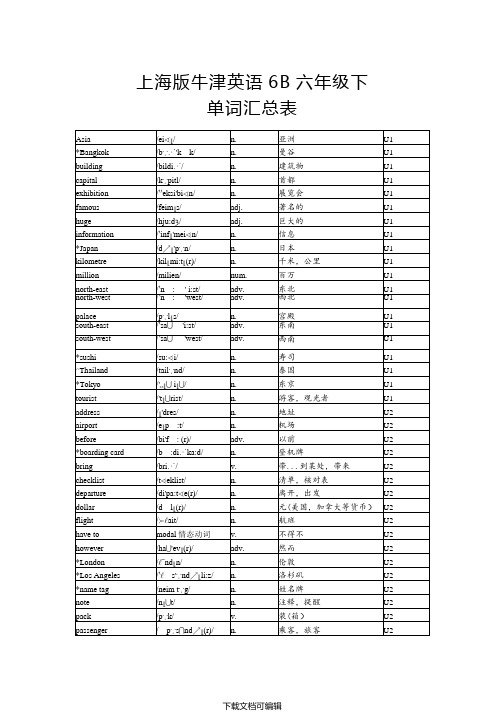
U1
palace
/pls/
n.
宫殿
U1
south-east
/sa'i:st/
adv.
东南
U1
south-west
/sa'west/
adv.
西南
U1
*sushi
/su:i/
n.
寿司
U1
^Thailand
/tailnd/
n.
泰国
U1
*Tokyo
/'i/
n.
东京
U1
tourist
/'trist/
n.
游客,观光者
adj.
可能,能做到(或取得)
U5
possibly
[ˈpɒsəbli]
adj.
(外貌)好看的
U5
grow
[grəʊ]
v.
长大,长高
U5
in front of
在...前面
U5
*kilogram
[ˈkɪləgræm]
n.
千克,公斤
U5
look for
寻找
U5
*magic
[ˈmædʒɪk]
adj.
有魔力的
U5
poor
[pɔ:(r)]
adj.
不擅长的
U5
possible
[ˈpɒsəbl]
n.
洛杉矶
U2
*name tag
/neim tg/
n.
姓名牌
U2
note
/nt/
n.
注释,提醒
U2
pack
/pk/
v.
装(箱)
U2
最新牛津上海版一起六年级下册unit 4《staying healthy》教案1.doc
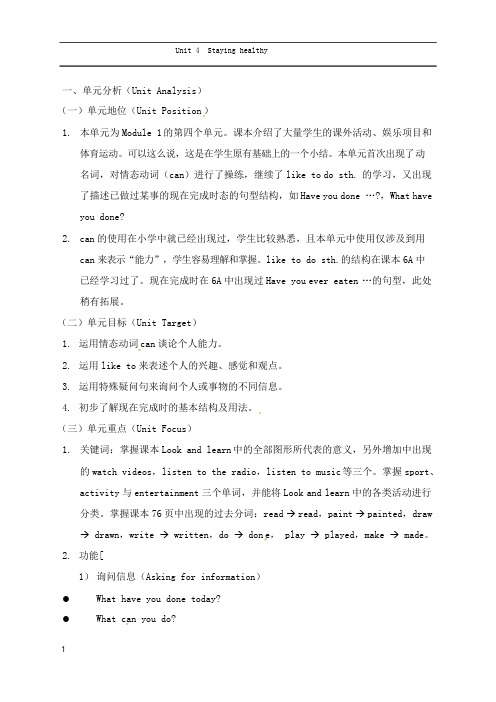
Unit4Staying healthy一、单元分析(Unit Analysis)(一)单元地位(Unit Position)1.本单元为Module1的第四个单元。
课本介绍了大量学生的课外活动、娱乐项目和体育运动。
可以这么说,这是在学生原有基础上的一个小结。
本单元首次出现了动名词,对情态动词(can)进行了操练,继续了like to do sth.的学习,又出现了描述已做过某事的现在完成时态的句型结构,如Have you done…?,What have you done?2.can的使用在小学中就已经出现过,学生比较熟悉,且本单元中使用仅涉及到用can来表示“能力”,学生容易理解和掌握。
like to do sth.的结构在课本6A中已经学习过了。
现在完成时在6A中出现过Have you ever eaten…的句型,此处稍有拓展。
(二)单元目标(Unit Target)1.运用情态动词can谈论个人能力。
2.运用like to来表述个人的兴趣、感觉和观点。
3.运用特殊疑问句来询问个人或事物的不同信息。
4.初步了解现在完成时的基本结构及用法。
(三)单元重点(Unit Focus)1.关键词:掌握课本Look and learn中的全部图形所代表的意义,另外增加中出现的watch videos,listen to the radio,listen to music等三个。
掌握sport、activity与entertainment三个单词,并能将Look and learn中的各类活动进行分类。
掌握课本76页中出现的过去分词:read→read,paint→painted,draw →drawn,write→written,do→don e,play→played,make→made。
2.功能[1)询问信息(Asking for information)●●1What have you done today? What can you do?。
2019年牛津上海版英语(一起)六年级下册Unit 4《Staying healthy》ppt课件
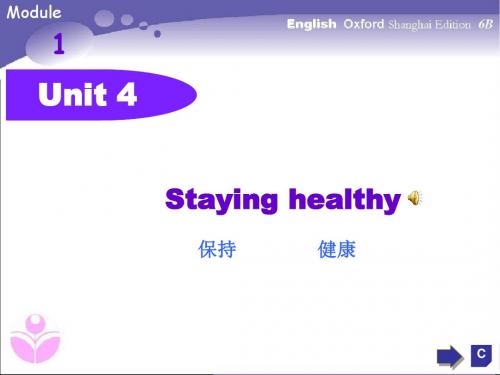
You should wear more clothes.
C
1
2
PIGGY BANK
GOLD MINE
Read, match and say
Can you give the correct answers?
5-1
1
2
3
4
5
C
PIGGY BANK
GOLD MINE
Why do I always have a stomach ache?
C
PIGGY BANK
GOLD MINE
Listen and say
Why do I always have a headache?
2-1
It’s because you watch too much television, I’m afraid.
too much+u.n 太多
What should I do?
PIGGY BANK
GOLD MINE
Read and write
How did these people feel?
Complete each sentence.
stomach ache 1. Joe’s stomach hurt. He has a _______________. 2. Larry didn’t go to the dentist for years. Now he has bad toothache _______________. 3. Alan stayed at home from school because he had a cold cough and a _______________. headache 4. Ben’s head hurt. He has a _______________.
牛津版上海版六年级下册 Unit 4 Staying healthy
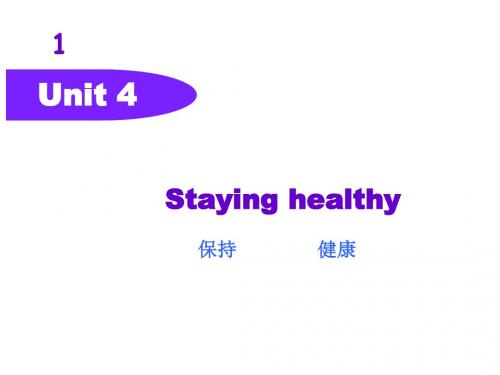
You should watch less television.
1
2
PIGGY BANK
GOLD MINE
2-2
Why do I always have a cold?
It’s because you don’t wear enough clothes, I’m afraid.
What should I do?
You should wear more clothes.
1
2
PIGGY BANK
GOLD MINE
Read, match and say
Can you give the correct answers?
5-1
1
2
3
4
5
PIGGY BANK
GOLD MINE
Why do I always have a stomach ache?
PIGGY BANK
GOLD MINE
Read and write
How did these people feel?
Complete each sentence.
stomach ache 1. Joe’s stomach hurt. He has a _______________. 2. Larry didn’t go to the dentist for years. Now he has bad toothache _______________. 3. Alan stayed at home from school because he had a cold cough and a _______________. headache 4. Ben’s head hurt. He has a _______________.
六年级下册英语一课一练-Module 1 Unit 4 Staying healthy同步练习3 牛津上海版一起含解析
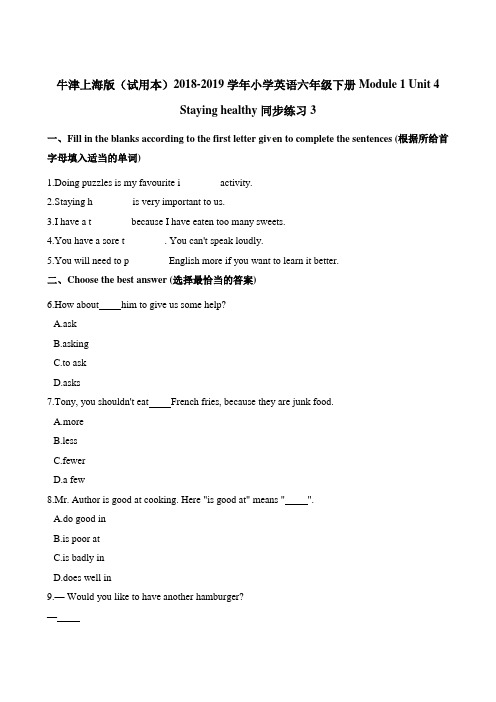
牛津上海版(试用本)2018-2019学年小学英语六年级下册Module 1 Unit 4Staying healthy同步练习3一、Fill in the blanks according to the first letter given to complete the sentences (根据所给首字母填入适当的单词)1.Doing puzzles is my favourite i________activity.2.Staying h________is very important to us.3.I have a t________because I have eaten too many sweets.4.You have a sore t________. You can't speak loudly.5.You will need to p________English more if you want to learn it better.二、Choose the best answer (选择最恰当的答案)6.How about him to give us some help?A.askB.askingC.to askD.asks7.Tony, you shouldn't eat French fries, because they are junk food.A.moreB.lessC.fewerD.a few8.Mr. Author is good at cooking. Here "is good at" means " ".A.do good inB.is poor atC.is badly inD.does well in9.— Would you like to have another hamburger?—A.Yes, I'm full.B.No, thanks.C.No, just a little.D.All right.10.Do you enjoy pop music?A.listeningB.listening toC.listenD.listen to11.— Have you ever had sore throat?— No, never.A.aB.anC./D.the12.—You should wear . You hands are cold.—OK, I will.A.moreB.lessC.manyD.little13.—Try to watch television. You are shortsighted now. —All right. I'll take your advice.A.too muchB.too manyC.moreD.less14.It's outside. I can wear a dress!A.warm enoughB.enough warmC.cold enoughD.enough cold15.—don't you buy a new uniform?— Because I don't have .A.When, money enoughB.Why, enough moneyC.How, money enoughD.What, enough money16. important day it will be tomorrow!A.WhatB.What anC.HowD.How an三、Complete the sentences with the given words in their proper forms (用括号中所给单词的适当形式完成下列句子。
【最新】六年级下册单词、课文中译英(上海版牛津英语)

六下 Module 1 U nit 1巨大的;伟大的 great 亚洲 Asia日本 Japan 东京 Tokyo 泰国 Thailand 曼谷 Bangkok西北 north-west 东北 north-east 东南 south-east西南 south-west 展览会 exhibition 首都 capital(大)船;舰 ship多远 how far 千米,公里 kilometre旅行 travel 博物馆 museum宫殿 palace游客,观光者 tourist多于;超过 more than 百万 million欣赏;喜爱 enjoyUnit 2机场 airport票;入场券登机牌 ticket 手提箱 suitcase 丝绸 silk 围巾;头巾scarf 洛杉矶 Los Angeles以前 before停留;呆 stay 几个 several然而 however 装(箱) pack足够的,充足的航班 enough 空间 space去... leave for... 应该 should到达... arrive at... 不得不 have to担心 worry离开,出发 departure 航班 flight乘客;旅客 passenger 护照 passport 登机牌 boarding card带来 bring元(美国,加拿大等货币) dollar 地址 addressUnit 3端午节 Dragon Boat Festival 比赛 race某物,某事 something 庆祝 celebrate 出生(be )born一千 thousand 以前 ago 国家 country 很,非常 very much 劝告,忠告 advice向...提出建议 give advice to...国王 king接受(某人的)劝告 take one ’s advice死,死亡 die 以后,后来 later 输掉,失去 lose战役 battle处于危险中 in danger河,江 river 农历的 lunar 纪念,记得 remember 有,带有 with没有 without 月饼 moon cake甜食,甜点,布丁 pudding 宁愿 would ratherUnit 4 保持 stay 保持健康 stay healthy 室内的 indoor 室外的 outdoor 篮球 basketball 电影,胶片 film 网球 tennis 模型 model去野餐 go on a picnic 邮票 stamp 烧烤野餐 barbecue来一次烧烤野餐 have a barbecue 头痛 headache 胃痛 stomach ache 牙痛 toothache 感冒 cold 发烧 fever 疼痛的 sore 咽喉 throat锻炼,运动 exercise 真正的,的确 really体育运动 sport 忘记 forgetModule 2 Unit 1 在...前面 in front of 有魔力的 magic 寻找 look for 开始 start按钮 button纸币,注释 note 按,压 press 微笑,笑 smile 背面,反面 back...年后 in...years ’time 重的 heavy 厘米 centimetre有...重,称...的重量 weigh 千克,公斤 kilogram宇航员 astronaut 同意 agree 擅长(be )good at 灭火 put out fires 可能的 possibly 苗条的 slim(外貌)好看的 good-looking不擅长,...差的(be )poor at 数学 Maths 练习,训练 practise 学,学习 learn 航天器,宇宙飞船 spacecraft 回来,返回 come backUnit 2季节性的 seasonal 变化 change 生活 life到处,向各处 around 有空调的 air-conditioned 学习 study食堂,餐厅 canteen 保暖 keep warm雪人 snowman 热饮料 hot drink 通知 notice早期的,早先的 early 袖子 sleeve 裤子 trousers短上衣,夹克衫 jacket短裙 skirt短裤 shorts皮带 belt Unit3双层车 double-decker 车费 fare在过去 in the past售票员 conductor 现今 nowadays 单层车 single-decker 大多数 most 没有一个 none 仍然,依旧,还是 still 也许,大概,可能 perhaps 不多的,很少的 few堵车,交通阻塞 traffic jam 轻便摩托车 motorcycle铁路 railway 停车场 car park 桥 bridge人行横道,十字路口 crossing 公共汽车停靠站 bus stopModule 3 Unit 1(使)下沉,(使)沉没 sink 清洁工人 cleaner 愉快的 happily 起先 at first 温和的 gently 轻微的 slightly 缓慢地 slowly 突然 suddenly 快速的 quickly 立即 immediately台风 typhoon 猛烈的 fiercely行进,移动 pass 小心的 carefully 温和的 gentle 拿着,抓住 hold雨衣 raincoat紧紧的 tightly旗,旗帜 flag进行帆板运动 windsurf盆 pot可能 may物体 object (使)破,碎 break波浪 waveUnit 2四分之一 quarter 小河,溪流 stream 地球 earth 鲸 whale聪明的 intelligent海星 starfish 海马 sea horse 有趣的 interesting 重要的 important 污染,弄脏 pollute 覆盖 cover 如果 if淋浴 shower 洗淋浴 take a shower 农作物 crop使用,利用;用途,功能 use节省,节约 save 浪费 waste 修理 fix 滴(漏)水的 dripping 水龙头 tap 流动的 running 关掉 turn off 代替 instead of 沐浴,洗盆浴 bathUnit 3森林 forest 陆地,土地 land 地区 area 窝,巢 nest 洞,孔 hollow 木头 wood砍倒 cut down 找出,查明 find out 环境 environment塑料,塑料制的,塑料的 plastic油,石油 oil 羊毛 wool 棉花,棉布 cotton 玻璃,玻璃杯 glass 沙 sand 材料 material由...制成的(be )made of 木制的 wooden毛纺的,羊毛的 woollen 一件商品(物品)itemModule 1 U nit 1 巨大的;伟大的亚洲日本东京泰国曼谷西北东北东南西南展览会首都(大)船;舰多远千米,公里旅行博物馆宫殿游客,观光者多于;超过百万欣赏;喜爱Unit 2机场票;入场卷登机牌手提箱丝绸围巾;头巾洛杉矶以前停留;呆几个然而装(箱)足够的,充足的航班空间去... 应该到达... 不得不担心 离开,出发航班乘客;旅客 护照 登机牌带来元(美国,加拿大等货币) 地址Unit 3端午节 比赛 某物,某事 庆祝 出生一千 以前 国家很,非常 劝告,忠告向...提出建议国王接受(某人的)劝告 死,死亡 以后,后来输掉,失去 战役 处于危险中 河,江 农历的 纪念,记得 有,带有 没有 月饼甜食,甜点,布丁 宁愿Unit 4保持保持健康室内的室外的篮球电影,胶片网球模型去野餐邮票烧烤野餐来一次烧烤野餐头痛胃痛牙痛感冒发烧疼痛的咽喉锻炼,运动真正的,的确体育运动忘记Module 2Unit 1 在...前面有魔力的寻找开始按钮纸币,注释按,压微笑,笑背面,反面...年后重的厘米有...重,称...的重量千克,公斤宇航员同意擅长灭火可能的苗条的(外貌)好看的不擅长,...差的数学练习,训练学,学习航天器,宇宙飞船回来,返回Unit 2 季节性的变化生活到处,向各处有空调的学习食堂,餐厅保暖雪人热饮料通知早期的,早先的袖子裤子短上衣,夹克衫短裙短裤皮带Unit3 双层车车费在过去售票员现今单层车大多数没有一个仍然,依旧,还是也许,大概,可能不多的,很少的堵车,交通阻塞轻便摩托车铁路停车场桥人行横道,十字路口公共汽车停靠站Module 3Unit 1 (使)下沉,(使)沉没清洁工人愉快的起先温和的轻微的缓慢地突然快速的立即台风猛烈的行进,移动小心的温和的拿着,抓住雨衣紧紧的旗,旗帜进行帆板运动盆可能物体(使)破,碎波浪Unit 2 四分之一小河,溪流地球鲸聪明的海星海马有趣的重要的污染,弄脏覆盖如果淋浴洗淋浴农作物使用,利用;用途,功能节省,节约浪费修理滴(漏)水的水龙头流动的关掉代替沐浴,洗盆浴Unit 3 森林陆地,土地地区窝,巢洞,孔木头砍倒找出,查明环境塑料,塑料制的,塑料的油,石油羊毛棉花,棉布玻璃,玻璃杯沙材料由...制成的木制的毛纺的,羊毛的一件商品(物品)Module 1 U nit 1great AsiaJapan Tokyo Thailand Bangkoknorth-west north-east south-eastsouth-west exhibition capitalshiphow farkilometretravelmuseumpalace touristmore than millionenjoyUnit 2airportticket suitcase silk scarf Los Angelesbeforestay severalhowever packenough spaceleave for... shouldarrive at... have toworrydepartureflightpassenger passport boarding cardbring dollar addressUnit 3 Dragon Boat Festival race something celebrate (be )bornthousand ago country very much advicegive advice to...kingtake one ’s advice die laterlosebattlein danger river lunar remember withwithout moon cake pudding would ratherUnit 4 stay stay healthy indoor outdoor basketball film tennis modelgo on a picnic stamp barbecue have a barbecue headache stomach ache toothache cold fever soreexercise hroat exercise reallysport forgetModule 2 Unit 1in front of magic look for start button note press smile backin...years ’time heavy centimetre weigh kilogramastronaut agree(be )good at put out fires possibly slimgood-looking(be )poor atMaths practise learn spacecraft come backUnit 2seasonal change life aroundair-conditioned study canteen keep warmsnowman hot drink notice early sleeve trousersjacketskirtshortsbelt Unit3double-decker fare in the pastconductor nowadays single-decker most none still perhaps fewtraffic jam motorcyclerailway car park bridge crossing bus stopModule 3 Unit 1sink cleaner happily at first gently slightly slowly suddenly quickly immediatelytyphoon fiercelypass carefully gentle holdraincoattightly flag windsurfpotmayobject breakwaveUnit 2quarter stream earth whale intelligentstarfishsea horseinterestingimportantpollutecoverifshower take a showercropusesavewaste fix drippingtaprunningturn offinstead ofbath Unit 3forest landareanesthollowwoodcut downfind outenvironmentplasticoilwoolcottonglasssandmaterial(be)made ofwoodenwoollenitemModule 1 City lifeUnit 1 Great cities in Asia郭老师和她的学生们在一个关于亚洲著名城市的展览会上。
六年级下英语教案-Module 1 Unit 4 Staying healthy_牛津版(上海)
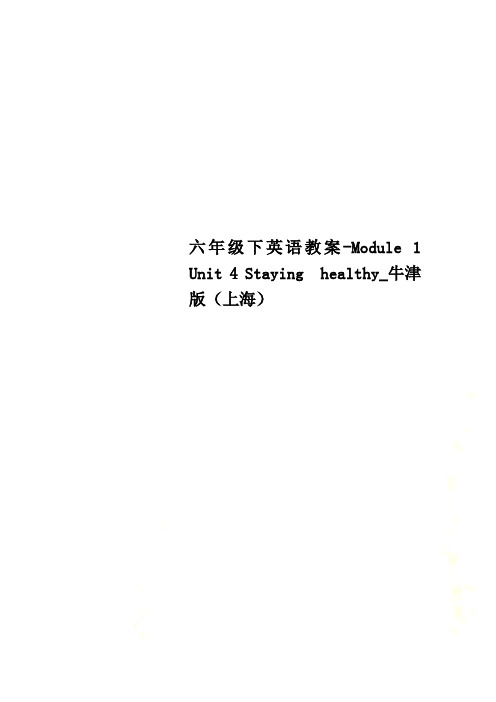
六年级下英语教案-Module 1 Unit 4 Staying healthy_牛津版(上海)Module 1 City lifeUnit 4 Staying healthy教学目标:1.学习用What’s your favourite…?询问他人最喜欢的事情,并用I like doing…回答。
2.学习用特殊疑问句Why do I always…?询问原因,并用It’sbecause…来回答。
3.学习用What should I do?来询问应该做的事及其回答。
4.复习less和more表示“更少的”和“更多的”。
教具准备:small blackboard radio cards课时安排:四课时第一课时教学过程:Step 1: Show the subject and the aims.1. Greetings.2. Show the subject and the aims.T: Boys and girls, today we’re going to learn Module 1 City life Unit 1 Great cities in Asia(板书)Here are our aims, they are…(利用小黑板出示学习目标)Learn aims:1.学习本课的单词。
Step2:第一次先学后教T: Boys and girls, today we’ ll continue learn Module 1 City life Unit 4 Staying healthy(板书)Here are our aims, they are…(利用小黑板出示学习目标)Learn aims:1.学习用What’s your favourite…?询问他人最喜欢的事情,并用I like doing…回答。
Step2:第一次先学后教先学:Show the learn guide one :请同学们根据所学的单词自己学习“Look and read”这部分,找出不会读的单词和不理解的句子。
牛津上海版英语六年级下册Unit4单元测试有答案
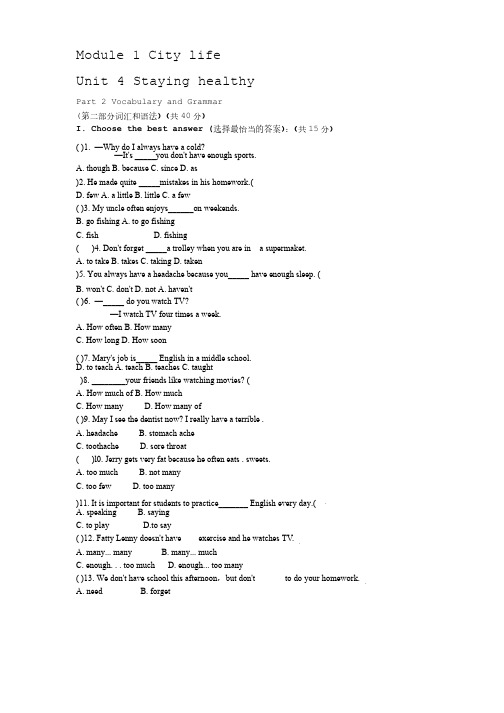
Module 1 City lifeUnit 4 Staying healthyPart 2 Vocabulary and Grammar(第二部分词汇和语法)(共40分)分)I. Choose the best answer (选择最怡当的答案):(共15分)分)( )1. —Why do I always have a cold?—It's _____you don't have enough sports.A. thoughB. becauseC. sinceD. as)2. He made quite _____mistakes in his homework.(D. few A. a little B. little C. a few( )3. My uncle often enjoys______on weekends.B. go fishing A. to go fishingC. fishD. fishing( )4. Don't forget _____a trolley when you are in a supermaket.A. to takeB. takesC. takingD. taken)5. You always have a headache because you_____ have enough sleep. (B. won'tC. don'tD. not A. haven't( )6. —_____ do you watch TV?—I watch TV four times a week.A. How oftenB. How manyC. How longD. How soon( )7. Mary's job is_____ English in a middle school.D. to teach A. teach B. teaches C. taught)8. ________your friends like watching movies? (A. How much ofB. How muchC. How manyD. How many of( )9. May I see the dentist now? I really have a terrible .A. headacheB. stomach acheC. toothacheD. sore throat( )l0. Jerry gets very fat because he often eats . sweets.A. too muchB. not manyC. too fewD. too many)11. It is important for students to practice_______ English every day.(A. speakingB. sayingC. to playD.to sayexercise and he watches TV. .( )12. Fatty Lenny doesn't have exercise and he watches TVA. many... manyB. many... muchC. enough. . . too muchD. enough... too many( )13. We don't have school this afternoon,but don't to do your homework.A. needB. forgetC. likeD. want )14. — Do you enjoy reading or movies? (B. Yes. A. No.C. Sorry.D. Neither. ( )15. — So, the square root of 144 is 12?A. All right.B. That's right.C. Not bad.D. Okay.E. Complete the sentences with the given words in their proper forms(用括号内所给单词的适当括号内所给单词的适当 形式完成下列句子):(共6分)分)1. Table tennis is usually played . (indoor)2. The Joker tried to find the Batman, (really)3.When he was 95,he became_______ so that he couldn't remember a thing, (forget)4. It ,sto eat 17 fried chicken wings at a time, (health) 5. People always say that makes perfect, (practise)6. Whether he likes me became the of my heart, (puzzle)III. Rewrite the following sentences as required (根据所给要求,改写下列句子。
(完整)上海版牛津英语六年级下册第一单元默写-答案

Oxford English 6B Module 1 Unit 1一、根据音标写单词、词性及中文1. /'eiʃə/ Asia n. 亚洲2. /dʒə'pæn/ Japan n. 日本3. /'təukiəu/ Tokyo n. 东京4. /'tailænd/ Thailand n. 泰国5. /'bæŋkɔk/ Bangkok n. 曼谷6. /'nɔ:θ'i:st/ north-east adv. 东北7. /'nɔ:θ'west/ north-west a dv. 西北8. /,sauθ'west/ south-west a dv. 西南9. /,sauθ'i:st/ south-east adv. 东南10. /,eksi'biʃn/ exhibition n. 展览会11. /'kæpitl/ capital n. 首都12. /'kilə,mi:tə/ kilometer n. 千米;公里13. /,infə'meiʃn/ information n. 信息14. /'pælis/ palace n. 宫殿15. /'tuərist/ tourist n. 游客;观光者16. /'miljən/ million num. 百万17. /'bɪldɪŋ/ building n. 建筑物18. /hju:dʒ/ huge a dj. 巨大的19. /'feiməs/ famous a dj. 著名的20. /'su:ʃi/ sushi n. 寿司二、中译英1. 亚洲大都市great cities in Asia2. 去不同城市旅行travelling to different cities3. 与…不同be different from4. A和B之间的不同之处the difference between A and B5. 在展览会上at an exhibition6. 中国的首都the capital of China7. 泰国的首都the capital of Thailand8. 哪个城市是日本的首都?Which city is the capital of Japan?9. 巴黎是法国的首都。
牛津上海版六年级英语下Unit4《Staying healthy》课件(3)
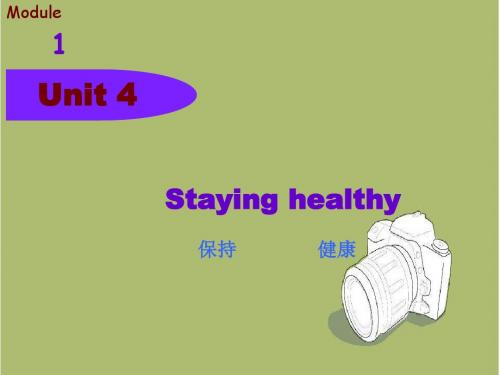
PIGGY BANK
GOLD MINE
Read and write
How did these people feel?
Complete each sentence.
stomach ache 1. Joe’s stomach hurt. He has a _______________. 2. Larry didn’t go to the dentist for years. Now he has bad toothache _______________. 3. Alan stayed at home from school because he had a cold cough and a _______________. headache 4. Ben’s head hurt. He has a _______________.
toothache / /
C
Look and learn
a headache
['hedeIk]
a stomach ache
['stʌmək,eIk]
toothache
['tuθ,eIk]
a cold
a fever
['fi:və]
a sore throat
[sɔ:] [θrəut] `
5
C
PIGGY BANK
GOLD MINE
Why do I always have toothache?
5-5
Miss Ma
1
2
3
4
5
C
PIGGY BANK
GOLD MINE
Ask and answer
Suppose you are one of Doctor Chen’s patients. Talk like this: S1: Why do I always have (a) _______? S2: It’s because you …, I’m afraid.
- 1、下载文档前请自行甄别文档内容的完整性,平台不提供额外的编辑、内容补充、找答案等附加服务。
- 2、"仅部分预览"的文档,不可在线预览部分如存在完整性等问题,可反馈申请退款(可完整预览的文档不适用该条件!)。
- 3、如文档侵犯您的权益,请联系客服反馈,我们会尽快为您处理(人工客服工作时间:9:00-18:30)。
Unit 4 Staying healthy(一)知识与技能1熟练掌握特殊疑问句“ Why…?” 和” How often…?”2熟练掌握连词because 的用法。
3巩固like/love/enjoy +doing 结构(二)过程与方法1使用‘wh-‘questions 询问学生所喜欢的活动并由此引出like/love/enjoy +doing 结构e.g. What’s your favourite indoor/outdoor activityI like/love/en joy +swimming/singing/working…2使用‘wh-‘questions询问某事发生的原因,练习对话:Why do I always have a headache?You always have a headache because you watch too much television.3使用‘How’questions 询问事情发生的频率e.g. How often does Danny do some revision4操练句型How often ... ?…once a month. / twice a year.反复操练该句型,使学生熟练掌握。
(三)情感、态度与价值观通过学习课文,学生了解到运动有益健康。
身体的不适和疾病源于不健康的生活习惯。
因此,为了有健康的身体,应有规律地参加适当的室内和室外活动。
Period 1Language focus:Using nouns to identify activitiese.g. singing /dancing/running/swimming /playing/workingUsing the simple present tense to express interestse.g. He likes singing/She enjoys swimming/We love playing.Pre-task preparationLanguage learning activity(This section aims at providing students with opportunities to practise the language/vocabulary needed or become familiar with the background for the task that follows.)1 Play the recording: Sing a song. Students listen first. Then the whole class follows and sings together.2 Divide the students into groups. Ask the students to practise singing and acting the song.3 Groups take turns to sing and act the song in front of the class.4 Ask the students to vote for the best group.Period 2Language focus:Using nouns /noun phrases to identify conditionse.g. a headache/a stomach-ache/toothache/a cold/a fever/a sore throatAsking ‘wh-‘questions to find out the reasone.g. Why do I always have a headacheUsing connectives to give reasonse.g. You always have a headache because you watch too much television.Using adverbs to express degreee.g. too much/too manyPre-task preparation1 Introduce new vocabulary items: a headache, a stomach-ache, toothache, a cold, a fever, a sore throat. Encourage students to use facial expressions and body language to help convey the meanings.2 Play the recording: Look and learn and Think and say. Students listen and follow in their books.3 Play the recording again. Students listen and repeat.4 Invite students to talk about their experience of suffering from a headache, a stomach-ache, toothache, a cold, a fever or a sore throat.While-task procedure1 Students work in groups of five Distribute a copy of photocopiable page 9 to each group. Four members in the group pretend to feel unwell and one member pretends to be Doctor Chen. Ask students to follow the modeled dialogue and work together to complete the dialogue in the other pictures. Tell them to think about different reasons for not feeling well. Then students practise the dialogue in groups.2 Groups take turns to role-play the dialogue in class. Encourage students to use facial expressions and body language and be as dramatic as possible. Write all the reasons for not feeling well on the board to get students familiar with the target language. Finally, vote for the best group.3 Still in groups, ask students to draw and write down different ways for keeping themselves healthy. Collect students’work and put it on the display board.Post-task activityWorkbook page 7ConsolidationGrammar Practice Book 7A page 12Period 3Language focus:Using adjectives to describe activitiese.g. indoor activities/outdoor activitiesUsing nouns to identify activitiese.g. fishing /cycling/swimmingUsing ‘wh-‘questions to find out various kinds of specific information about a persone.g. What’s your favourite indoor/outdoor activityAsking ‘How’questions to find out quantitye.g. How many of my classmates like watching television bestUsing the simple present tense to express opinionse.g….students like …best.Pre-task preparation1 Differentiate between indoor activities and outdoor activities. Write indoor activities and outdoor activities on the board. Read them aloud. Invite the whole class to repeat the words after you. Explain briefly that indoor activities are activities carried on inside a building and outdoor activities are activities carried on outside a building.2 Invite a student to read the list of indoor and outdoor activities in Read and match aloud. Ask a few more able students to think of more indoor and outdoor activities.3 Give students some time to complete Read and match. Check answers orally.4 Students work in pairs to practise the target language in A survey .Invite some pairs of students to role-play the dialogue in class.While-task procedure1 Students work in groups. Distribute a copy of photocopiable page 10 to each group. Ask students to carry out the survey using the target language. Each group completes one survey form. Write down the other groups’findings on the survey form as well. Each group completes a simple report.2 Invite representatives from the groups to come out to the front and read their reports aloud .Collect students’work and put it on the display board.3 Make sure students know how to tead and draw bar chart .4 Students work in groups. Distribute a copy of photocopiable page 11 to each group. Ask students to carry out the survey using the target language. Each group completes one survey form. Write down the other groups’findings on the survey form as well. Each group completes a simple report and draws a bar chart.5 Invite representatives from the groups to come forward and read their reports aloud. Collect students’work and put it on the display board.ConsolidationGrammar Practice Book 7A page 13Period 4Language focus:Asking ‘How’questions to find out frequencye.g. How often does Danny do some revisionUsing the simple present tense to describe habitual actionse.g. He does some revision once a month.Using adverbs to express frequencye.g. once a month/ twice a yearPre-task preparation1 Remind students about the concept of ‘work and play’and review the song on page 14 again2 Invite a more able student to come out to the front and read Danny’s timetable. Other students keep their books closed and listen carefully3 Ask students some questions to check their understanding. Ask: How often does Danny do some revision How often does Danny watch television How often does Danny practise swimming How often does Danny help do the housework to elicit: He does some revision once a month. He watches television three times a day. He practices swimming twice a year. He never helps do the housework.4 Ask students to give their opinion about Danny’s timetable. Write the list of opinions on the board. In conclusion, students should understand that Danny’s timetable is not very good.While-task procedure1 Ask each student to think of and write a good timetable for himself/herself.3 When the students have finished, ask them to work in pairs and compare their timetables with their classmates’timetables by using the target language. One student starts the conversation by asking: How often do you…They take turns to ask and answer questions about the timetables.ConsolidationGrammar Practice Book 7A pages 14 and 16Photocopiable pages 12, 13, 14 and 15NOTES: (单元教后记)1、通过学习本单元课文,学生了解到运动有益健康。
